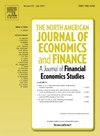Carbon emission control, tariff-carbon tax reform and intersectoral migration in the presence of international capital inflows
IF 3.8
3区 经济学
Q1 BUSINESS, FINANCE
North American Journal of Economics and Finance
Pub Date : 2025-04-15
DOI:10.1016/j.najef.2025.102434
引用次数: 0
Abstract
As highlighted by the World Bank (2023), multinational enterprises (MNEs) can provide both a fundamental risk to and an opportunity for climate change mitigation. It is critical for policymakers to consider policies involving MNEs for both trade openness and carbon emission controls. This paper employs a modified version of the urban–rural migration model, incorporating mobile capital and multinational firms, to analyze the policy effects of carbon tax and tariff on urban unemployment and national income. Assuming independent policy implementation, the study finds that increasing the carbon tax on pollution-generating production raises urban unemployment rates, while increasing tariffs reduces them. The intersectoral wage gap is a key determinant of the policy effect on urban unemployment levels. The paper further highlights that the elasticity of factor demand in relation to the carbon tax is crucial for understanding its effects on national income. An increase in carbon tax on dirty factor increases (decreases) the national income if, and only if the dirty factor demand elasticity relating to carbon tax is smaller (larger) than one. Likewise, an import tariff on the importable manufacturing good increases the national income if, and only if, the import elasticity with respect to the tariff is smaller than one. Additionally, a point-by-point tariff-tax reform unambiguously raises urban unemployment rates, though it may reduce unemployment levels under certain conditions. If the import elasticity related to the tariff is significantly high (low), then the policy reform will increase (decrease) national income.
在国际资本流入的情况下,碳排放控制、关税-碳税改革和部门间移民
正如世界银行(2023年)所强调的那样,跨国企业既可以为减缓气候变化带来根本风险,也可以为减缓气候变化带来机遇。政策制定者必须考虑涉及跨国公司的政策,以促进贸易开放和控制碳排放。本文采用修正的城乡迁移模型,纳入流动资本和跨国公司,分析碳税和关税对城镇失业和国民收入的政策影响。该研究发现,假设政策独立实施,提高对产生污染的产品征收的碳税会提高城市失业率,而提高关税会降低失业率。部门间工资差距是政策对城市失业水平影响的关键决定因素。本文进一步强调,与碳税相关的要素需求弹性对于理解碳税对国民收入的影响至关重要。当且仅当与碳税相关的肮脏因素需求弹性小于(大于)1时,增加对肮脏因素的碳税会增加(减少)国民收入。同样,对可进口的制造业产品征收进口关税,当且仅当进口弹性相对于关税小于1时,国民收入才会增加。此外,逐点的关税改革无疑会提高城市失业率,尽管在某些条件下可能会降低失业率。如果与关税相关的进口弹性显著高(低),则政策改革将增加(减少)国民收入。
本文章由计算机程序翻译,如有差异,请以英文原文为准。
求助全文
约1分钟内获得全文
求助全文
来源期刊
CiteScore
7.30
自引率
8.30%
发文量
168
期刊介绍:
The focus of the North-American Journal of Economics and Finance is on the economics of integration of goods, services, financial markets, at both regional and global levels with the role of economic policy in that process playing an important role. Both theoretical and empirical papers are welcome. Empirical and policy-related papers that rely on data and the experiences of countries outside North America are also welcome. Papers should offer concrete lessons about the ongoing process of globalization, or policy implications about how governments, domestic or international institutions, can improve the coordination of their activities. Empirical analysis should be capable of replication. Authors of accepted papers will be encouraged to supply data and computer programs.

 求助内容:
求助内容: 应助结果提醒方式:
应助结果提醒方式:


